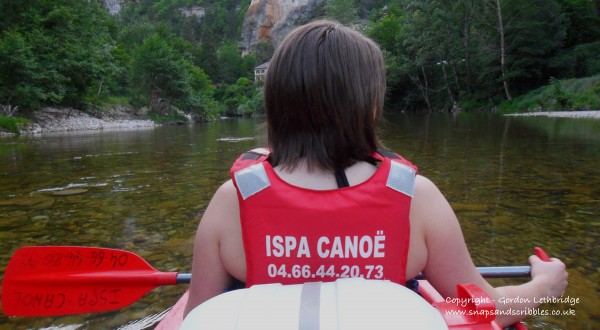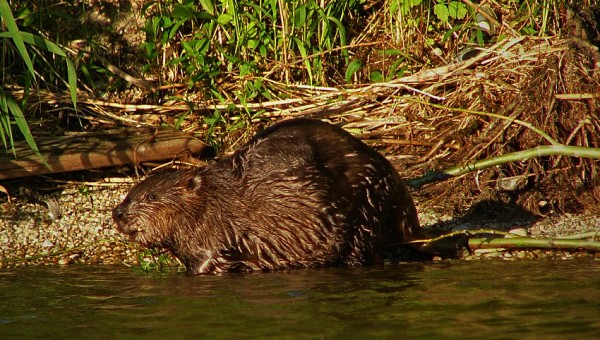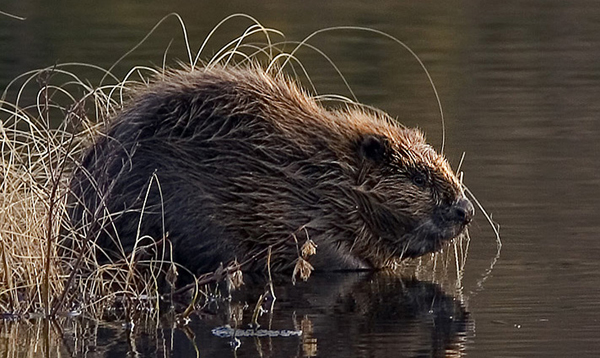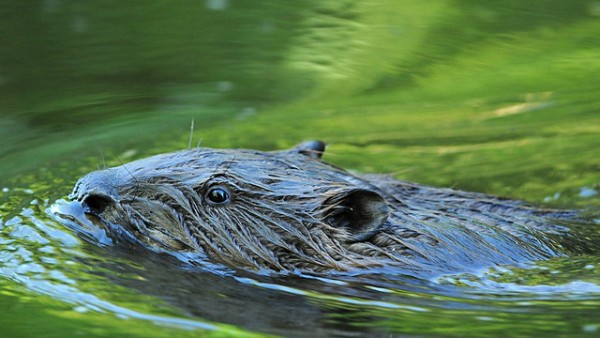The sun was heading towards the western horizon. It was late in the afternoon and shadows were lengthening and we were preparing for a canoe trip down the river. Being issued with head torches was a little unnerving as it meant we would be canoeing after dark; a completely new experience for most of the group. There would be rapids to negotiate and rocks and shallows to avoid; difficult enough in daylight.
A group of us were heading out on a beaver safari along the River Tarn downstream from the village of St Enimie The beavers are most active when the sun is low enough for no direct sunlight to reach the foot of the gorge. That an early evening start.
After a brief but comprehensive safety talk and some details about what to expect and how to best observe the beavers we launched the canoes.

Before we saw any beavers we encountered our first rapids. The word rapids conjures up a maelstrom of water and foam but these “rapids” were little more than an increase in water flow as the current was forced through a narrow section of the gorge. Nevertheless care had to be taken to avoid the very real dangers of submerged rocks and no one wanted to capsize this early on.

© Photo Nature – source: www.flickr.com
Although we spotted no beavers along this first part of the river as yet but we learned a great deal about them and how the European beaver (Castor fiber) differs from its North American cousin (Castor canadensis). They don’t build dams for a start. Along the banks there were plenty of signs of beaver activity. Stripped twigs and a few chewed branches showed where they had been eating.

After paddling for a couple of kilometres and still no sign of the beavers we pulled onto a pebble beach. Grass grew from between rocks and the place was littered with the detritus of the seasonal floods.
Beavers are shy creatures and will quickly disappear at the first sign of danger. Canoes and their occupants could conceivably be considered as danger so we spent a short while on the beach quietly watching the water down which we had just paddled.

© Per Harald Olsen
Our patience was rewarded as one and then another beaver put in an appearance along the distant bank. Armed with binoculars we could see two large rat like creatures in the water. I was, at this point, slightly disappointed as I had expected closer encounters than this.

We were soon back in the canoes and negotiating a series of rapids. These were a little more exciting and required our full attention if we were not to end up in the water. Where the river widened and the water was calmer we pulled the canoes up onto a small sandy beach. Climbing up a steep path our guide led us in to a large cave. A few metres in and our guide suggested we switch our head torches on.
What we saw was not the beavers we were looking for but cave paintings. It was almost like we had just discovered them. The cave was only accessible from the river; no other path led to the cave. No visitor centre or interpretive notices; no entry ticket; no souvenir kiosks; and no barriers between us and the paintings.

The paintings showed animals and men pursuing each other across the cave walls. It was obviously a hunting scene. I wondered how long these paintings had survived. The floodwaters obviously did not reach this high. Paintings like these were usually discovered by shepherd boys or goatherds looking for their lost animals not canoe guides. This was quite a find and must rank with Lacavaux Caves I thought.
Just as we were getting excited about these off the beaten track cave paintings our guide told us they were less than 20 years old. Apparently a university professor had produced them using the tools and paints that would have been used four thousand years ago as an experiment. Even though they were an academic exercise very few people know of these paintings so it is still something special and worth stopping off for.
Back on the river dusk was closing in. The canoe up front spotted a beaver only metres from the canoe. As the beaver realised the proximity of the canoe it slapped its tail and disappeared.
We continued in silence often just drifting with the current. We began switching the lead canoe to give everyone a chance to see a beaver up close and personal.

© Rudo Jurecek – source: www.flickr.com
After another set of rapids a beaver swam alongside our canoe. Less than two metres separated canoe and beaver. I just allowed the canoe to drift with the paddle across the gunwales. Being in the shadow of the gorge meant the canoe itself was not casting a shadow and, as far as the beaver was concerned, presented no danger.
This was the experience I had hoped for; a close encounter with a beaver.
Just as the canoe began to pick up speed prior to entering another small rapid the beaver headed off to the riverbank and the roots that hid the burrow that was its home. Darkness was rapidly approaching but the next fifteen minutes was like paddling down Beaver Alley. There were a dozen or more. Some encounters were close others further away. We just drifted along while beavers, sometimes in pairs, swam alongside the flotilla of canoes. Even our guide became excited as he confided that he had never seen so many on a single trip. What a bonus.

While there was still light we stopped for an evening snack. From the small promontory we could see the beavers swimming in the calmer water upstream and in the fading light could make out one or two foraging on the banks.
Being evening and close to water the mosquitoes were out in force. Attracted by our head lamps they were soon buzzing irritatingly around our heads. Back on the river the onslaught continued unabated. Then like a squadron of stealth fighters bats flew up the river feasting on inflight meals of fresh mosquitoes and moths, attracted by our lights, for dessert. How they avoided us, each other and low branches while pinpointing their meal with accuracy that would be the envy any Top Gun fighter pilot was amazing. It was all done by echolocation not sight.
Next came the ultimate paddling test of the evening. Darkness came suddenly in the foot of the gorge. The lead canoe’s lights some distance in front started bobbing erratically. There were rapids ahead.
“Keep to the middle,” our guide called, “and keep paddling”
This was easier said than done. In the light of the headlamp I could see the looming shape of the bank and a tangle of tree roots. Close to the bank light reflected off the maelstrom of water and foam. That could only mean an obstruction, probably rocks. The canoe slithered past, the side scraping on the stones, we fended off the bank and paddled like crazy as the canoe bucked and turned in it’s effort to dump us in the water.
Then just as suddenly we floated along in calmer, deeper water. Moments later we pulling the canoes up on the bank.
It had been a great evening. Excitement and adventure with beavers and bats with rock art, even if it was a facsimile, thrown in as an extra. Have you experienced a wildlife excursion? Tell us about it here.
Didier Azema, our naturalist and guide, leads many adventure excursions. The beaver excursion is just one of them. He can be reached on +33 4 66 44 25 10 or mobile +33 6 72 10 41 71. Canoes can be hired from ISPA Canoe for departures from St Chely du Tarn which is where we started our trip. They return you to your point of embarkation at the end of the trip. Suggested accommodation: Gites de Pougnadoires – three award winning gites on the banks of the river not far from St Enimie.
Declaration: I travelled as a guest of the Lozere Tourisme and SunFrance (Languedoc-Roussillon Tourisme). All my opinions are my own as I always maintain complete editorial control.